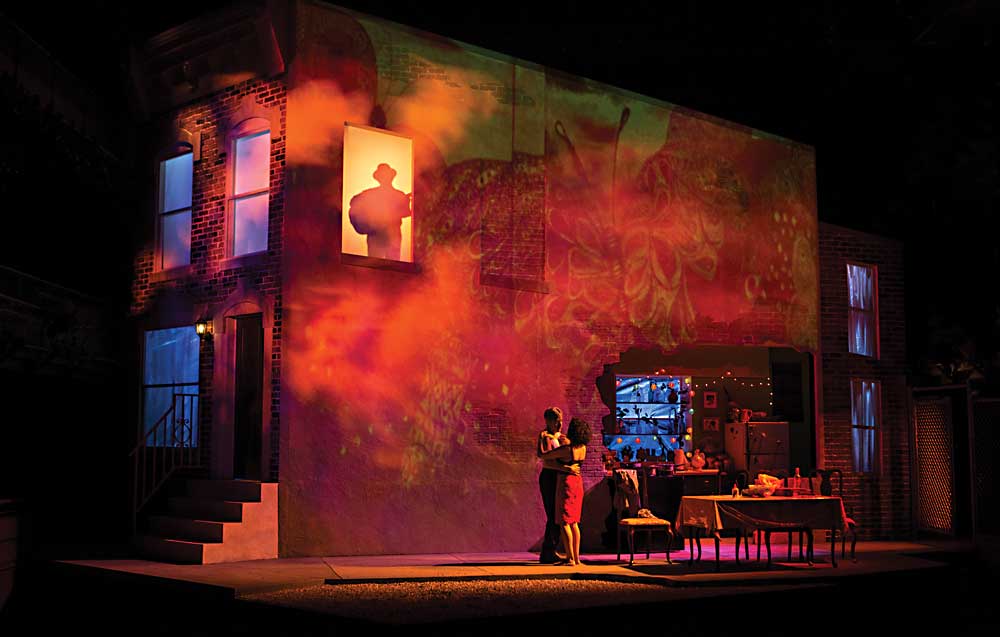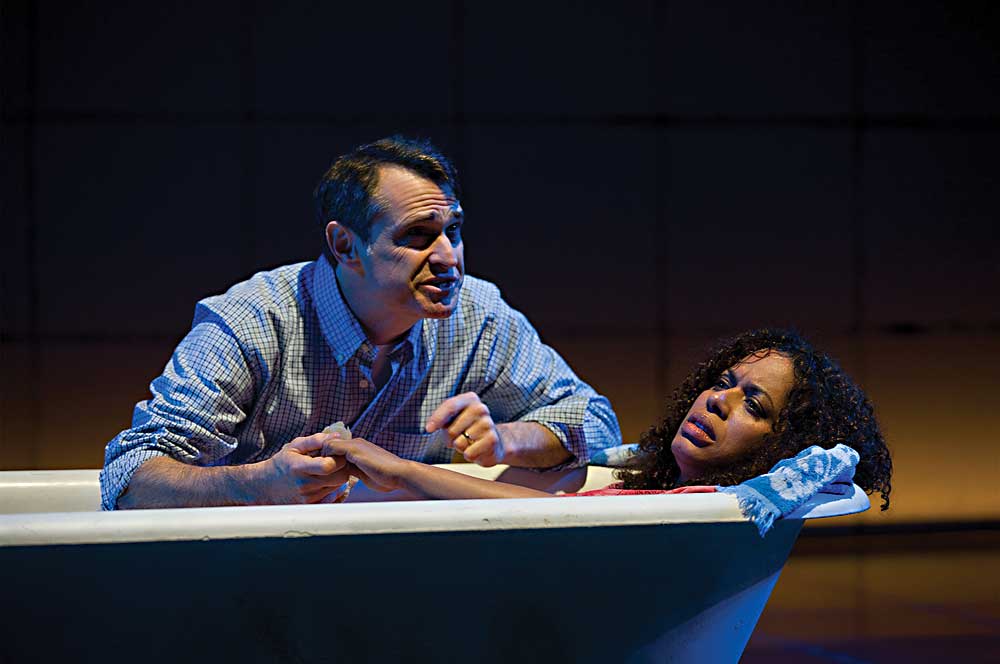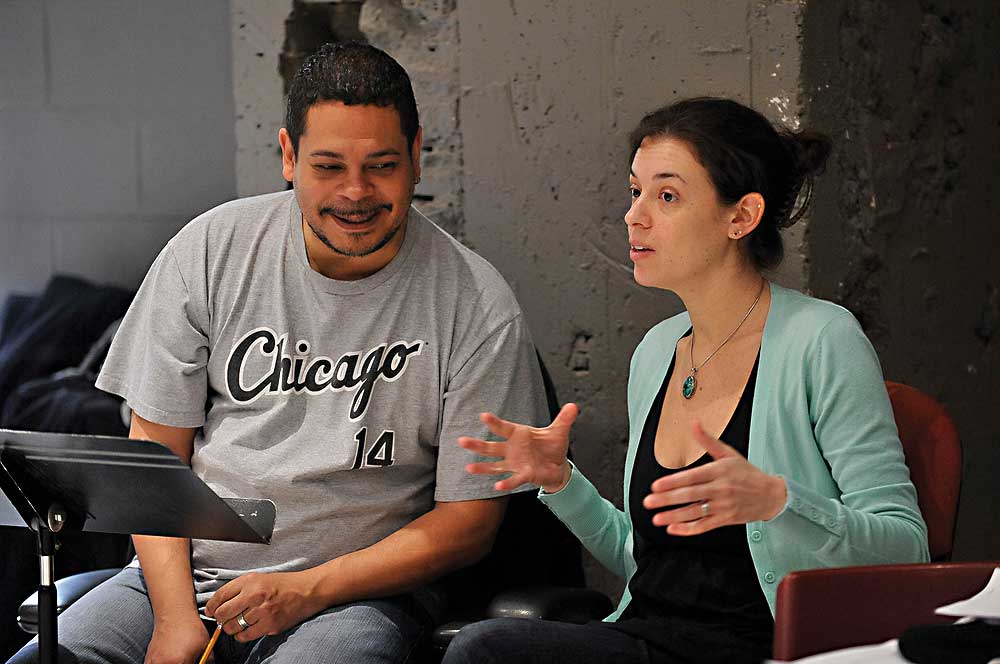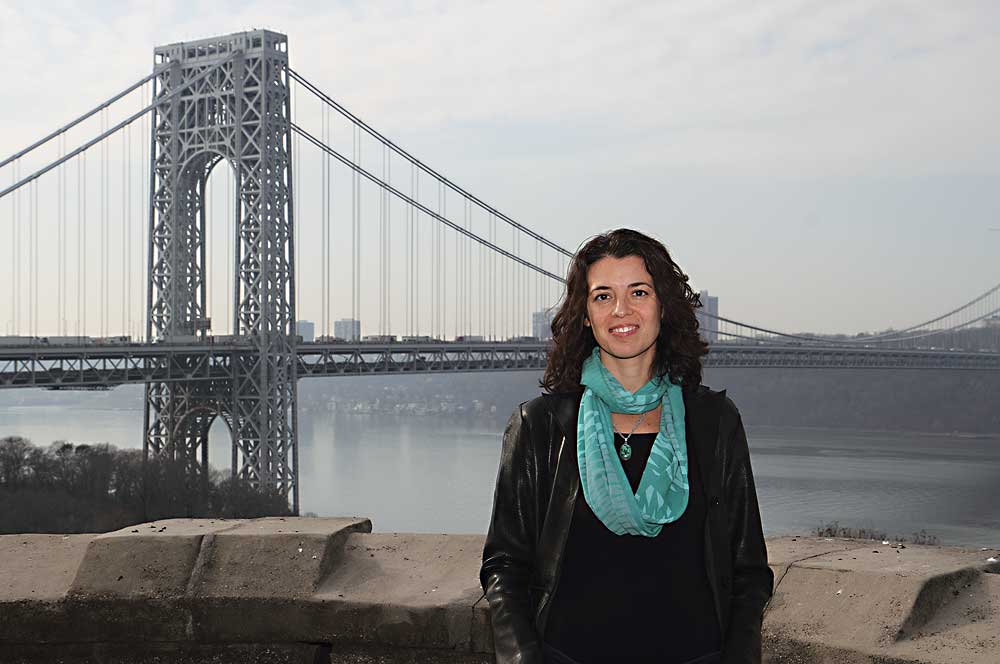The windows of Quiara Alegria Hudes’s Washington Heights apartment offer a majestic view, encompassing the Hudson River, the Palisades and the George Washington Bridge in all their glory; a pair of red-tailed hawks soar by regularly, and a bald eagle has become a recent visitor. Sitting at the desk in her bedroom, however, Hudes sees beyond this New York view and deep into the heart of North Philadelphia, more than a hundred miles to the southwest.
North Philly is the setting for Hudes’s acclaimed trilogy: Elliot, A Soldier’s Fugue (a Pulitzer Prize finalist), Water By the Spoonful (a Pulitzer winner) and The Happiest Song Plays Last, which debuted at the Goodman Theatre in Chicago last spring and begins performances at Second Stage in New York next month. But Hudes finds it easier to write about her North Philly community from up in New York, first on the Upper West Side and now in the Heights.
“I like to write with one foot in and one foot out,” says Hudes, whose process includes interviewing relatives and others at great length about their personal sagas—then carefully fictionalizing their stories. “I visit there all the time, but it’s easier to write from here, to get some distance. Being a little bit of an outsider gives me the distance needed to use my imagination.”
Hudes, 36, may be comfortable as an outsider because she has always been that way: She constantly visited the family her mother had left behind in North Philly’s Puerto Rican community, but she herself grew up in West Philly. If that sounds like no more than simple geography, Hudes explains the gulf: North Philly is isolated, she notes, cut off by its lack of bus and train service. “It feels like its own island,” she says. Like Pittsburgh’s Hill District, which August Wilson similarly wrote about long after he’d left it behind, Hudes says that North Philly “has its own air.”
And it wasn’t just her family’s old stomping grounds that made her feel like an outsider. Even in West Philly, a predominantly African-American neighborhood, she stood out—the child of a Puerto Rican mother and a Jewish father. Heightening the outsider’s vantage point, Hudes left this world for college—and for Yale, no less. There she studied music, which she pursued as a career until her mother encouraged her to return to writing. Her musical background shows up in her plays, as she uses music to draw out their themes: Bach in Elliot; jazz, especially John Coltrane, in Water; and Puerto Rican folk music in Happiest Song.
“There’s also something musical about her language,” says Armando Riesco, who has starred as Elliot throughout, journeying with the character from Iraq back home to North Philly and then off to Hollywood and back to the Middle East, struggling all along with the burdens of family dysfunction and a traumatic war experience. “Her writing feels very natural and everyday, but then suddenly it makes a turn, subtly, to a higher place.”
Blending musical themes with that naturalism was a conscious decision by Hudes. “I wanted to use all the tools in my Swiss Army knife,” she says.

in The Happiest Song Plays Last at the Goodman Theatre.
FROM HER EARLIEST PLAYS, YEMAYA”S BELLY and The Adventures of Barrio Grrrl, which she wrote while getting her master’s degree in playwriting at Brown University—Hudes blended grit and ritual, a familiar mix that might be labeled magic realism, though that’s a phrase she says she doesn’t love. It was with Elliot, A Soldier’s Fugue, though, that Hudes felt she’d found her voice.
As with Wilson and his 10-play cycle, Hudes didn’t set out to write a trilogy, but she eventually felt compelled to return to Elliot’s story. (In between she wrote 26 Miles, a play she was so dissatisfied with that she removed it from circulation; she also earned a Tony nomination for her book for In the Heights.)
“When I had the realization that I wanted to continue with Elliot, I saw both part two and part three before me as a coming-of-age trilogy,” she says. As with many of her plays, there is a real-life correlative for the trilogy, and she didn’t change his name: her own cousin, Elliot Ruiz.
“Elliot has had such an improbable and extraordinary life,” Hudes says of her inspiration. “He is funny and charming and still gross like a boy sometimes, but he’s also very sophisticated in his social skills. I’m just as drawn to his personality as to his story.”
She sees Elliot’s story as both quintessentially American and a great representation of the Puerto Rican experience, including the rough patches and demons he has had to survive to become stable and successful.
In Elliot, audiences hear directly from Elliot, his father and his grandfather as they reflect on their own war experiences, as well as those of Ginny, the aunt who raised him. There is virtually no direct conversation, with characters delivering soliloquies or reading and writing letters. But in Water, Elliot’s story is bursting with dialogue, much of it filled with hurt and anger, as he talks incessantly with his cousin Yaz and confronts his birth mother, Odessa. Meanwhile, Odessa works in a chat room under the moniker Haikumom, connecting with and nurturing recovering crack addicts like herself; for much of the play these characters speak only through their computers.
Water is far more ambitious in scope and style than Elliot, for various reasons. “The content demanded it, but I also wanted to give myself new challenges,” Hudes says. Having seen August: Osage County, Jerusalem and the Signature Theatre Company revival of Angels in America, Hudes thought to herself, “Let me make a big mess!”
Meanwhile, in Happiest Song, Hudes uses technology to create a firewall in communication, as Elliot and Yaz communicate via Gchat and avoid directly answering questions. Elliot is in Jordan, where he is suddenly transformed from consultant on a movie about the Iraq war to the film’s star. (This actually happened, with the 2007 movie Battle for Haditha.)
What all three plays have in common, Hudes says, is that they deal “with the things we don’t talk about.” In Elliot, that meant paring back the dialogue, even some that she felt was her best writing. “I was dealing with the limits of face-to-face conversation. There are so many things that can’t be said, that feel safer when you’re not looking someone in the eyes.”
She expands on the theme: “My tool as a playwright is simply conversation, so playwrights are always dealing with the limitation of conversation. We are either breaking through or going with it or dancing back and forth. Pinter is the classic example of someone exploring the limits of conversation.”

in Water by the Spoonful at
Hartford Stage.
THOSE THINGS PEOPLE DON’T TALK about—from drug addiction to war injuries, both physical and mental—have had a powerful impact on the family whose stories she has mined for her work. Hudes praises the generosity of Elliot, as well as the cousins who inspired Odessa and Yaz, in sharing these stories with her. But the plays are not straight biography, or autobiography. People often assume that Yaz is a stand-in for Hudes, because she is a music professor, but Hudes says Yaz was drawn from a cousin who stepped in as the older generation died off to become the backbone of the family and the community, there for one and all. “I always admired her so much,” says Hudes.
Hudes gets people to open up, says Ruiz, because “she makes people comfortable. She doesn’t just ask questions; she turns an interview into a conversation and then you trust her and began baring all those details.”
Hudes changes vital details because, while she wants to represent her community onstage, she isn’t looking to air her family’s secrets. In Water, Odessa’s young daughter dies because of Odessa’s addiction; Hudes says that if that had really happened, she never would have included it.
“But there is tough stuff in there that brought up some really vulnerable conversations which we wouldn’t have had otherwise,” Hudes concedes. The cousin who helped inspire the Odessa character, for instance, has been clean for 16 years, “but it takes 80 percent of her energy just staying sober,” and after inviting her to see Water in its premiere at Hartford Stage in 2011, Hudes worried about triggering a reaction.
“At intermission she was a total mess, and I said, ‘I’m sorry, I shouldn’t have brought you here—let me take you back to the hotel and we can hang out,’” Hudes recalls. Her cousin responded, “Are you crazy? I want to see the second act!” She told everyone around her that the part was based on her.
“There’s a deep pride—a feeling that these stories are valuable and were not necessarily being told, and my family appreciated that,” Hudes says.
Ruiz agrees. Watching the fictional Elliot on stage struggling with anger issues and pill addictions can be “overwhelming,” he concedes, adding with some understatement, “It gives people an idea of the things we’ve gone through.”
Ruiz in particular has been “like a collaborator” through all three plays, says Hudes, who prides herself on being a thorough researcher, whether the topic is Marine life, drug addiction or the Middle East. “I told her the Marines don’t tuck our pants into the boots—that’s the Army—and she fixed it,” Ruiz says. “She gets the facts and details right.”
Riesco, who plays Eliot in the trilogy, hadn’t met Ruiz before the first production of Elliot, but he has since, and meeting the real-life inspiration has definitely informed his performances. “We talked about what he went through growing up and in Iraq,” Riesco says. “It would be silly not to use him.” Still, Hudes points out that Riesco has made the fictional Elliot his own. “Armando gives him more grit and a few rougher edges,” she says.
After three plays, the actor and playwright have developed a shorthand, and the communication goes both ways. “Just his acting is such great dramaturgy for me, but I really appreciate his questions and notes,” she says.
Riesco appreciates this collaborative openness, which is not a universal trait of playwrights, he finds. “Some would say, ‘Don’t tell me what to do,’ but she always listens and takes my comments to heart.”

The Happiest Song Plays Last at the Goodman.
BUT SUCH FREEDOM WITH HER WORK comes only after Hudes feels comfortable with her creation. When starting a new play—and for some time after that—she flies solo. She doesn’t create an outline but instead pours out a “skeleton draft,” writing the entire play straight through. Even now, with a husband and two young children, she finds a “cave” and disappears into herself to “channel” the story inside her. Sometimes this means literally removing herself to check into a hotel room.
“At that point all bets are off,” Hudes says. “I don’t know where I’m going to be writing or when I’m going to come home. And I don’t know what’s going to happen with the play—it becomes very emotional and can get deeper than I thought it might. Those can be hard times.”
Some of the discoveries are joyful. Hudes started her skeleton draft of Water knowing Odessa would be den mother in a chat room without any idea of who else would populate that world. “All of a sudden the character Orangutan popped up—she hadn’t logged on in a long time—and then came Chutes and Ladders, a veteran at this,”she says. In the next scene, she learned about their buddy-buddy chemistry.
And when writing the end of the play, she realized that her characters were in love. “I was weeping as they were discovering that,” she recalls. “It was so exciting for me.” Writing these imagined characters, she admits, is more fun than creating the North Philly stand-ins for her family. “It’s easier—I’m less conscious of a responsibility to them.”
She doesn’t show anyone her play at that point because she doesn’t want to slow the process and it still feels too raw to get feedback. “I feel protective of my right not to know things then, not to have the answers, just to have the feelings inside me,” she says.
After this initial outpouring, Hudes spends perhaps another year forming this “messy lump of clay” into a polished piece. During that time she returns to being a creature of habit, preferring to write during the days, especially the mornings. “I’ve been with my husband Ray since I was 17 and I like hanging out with him, so I’ve always written when he’s at work,” she says. When her husband, now a public defender, was in law school, she found the erratic hours to be draining instead of freeing.
Hudes does most of her writing in the bedroom—she had used a desk handcrafted by her father in their office nook, but that space has since been commandeered by her young son, Julian. Hudes has always been adaptable. When her first child, Cecilia, was born, Hudes would put a towel on her writing desk so it could double as a changing table.
But she also likes to walk the neighborhood to clear her head, and for a change of scenery she enjoys writing in bars. “I’m a morning writer, so I know which bars open at 10 a.m. around here,” she says. “I’ll be in there with my laptop and my glass of wine.”
When ideas occur to her in off-hours, Hudes turns to “a writer’s best friend,” the notepad app on her phone, since she is prone to losing scraps of paper. She also hates clutter, calling herself a “purger” who burned all her notebooks on her last day of high school and doesn’t save drafts of her work. She is constantly rewriting, soliciting feedback from Ray, and later from Elliot, Armando and her director.
FOR THE NEW YORK PRODUCTION OF The Happiest Song Plays Last, Hudes asked Second Stage to pursue Ruben Santiago-Hudson, who has earned acclaim not only for his solo show, Lackawanna Blues, but for his acting and directing in August Wilson’s plays.
“I’ve admired Ruben for so long,” Hudes says. “When he directs, he fills his actors with life. He deeply understands the human psyche. His work is not about the set, not about the design, not about the concept—it’s about the story as it’s lived by the actors.”
While Hudes and Wilson are extremely different as artists, they are linked by their strong sense of place and by the way their deep love of music infuses their works. In Happiest Song, Hudes even has a homeless character, Lefty, that she worries seems too much like a Wilson character. Lefty is a composite of three people that Hudes remembers coming to her grandmother’s house for food, and what she recalls about them is that they would usually be very quiet, fixing their gaze on their feet either out of humility or a desire not to intrude more than necessary. But Lefty had other ideas; when he arrived during Hudes’s skeleton draft, she thought he’d be a silent character, like those men who came to her grandma’s door. Instead he burst forth, Wilson-style, about the river underneath the city.
Santiago-Hudson, who starred in Wilson’s autobiographical solo show How I Learned What I Learned just before directing Happiest Song, says that the strongest similarity between Wilson and Hudes, beyond their integrity, is their ability to write lyrically and in metaphors.
He loves the Boricua pride in Hudes’s plays, saying that while he doesn’t know much about North Philly, he understands how ethnic communities, especially Puerto Rican ones, “bring their culture and style wherever they go. My father was still trying to grow an avocado tree in Buffalo to the day he died,” he says. “It was a celebration of his beliefs in the spirit of his people.”
Like Riesco, Santiago-Hudson has been struck by Hudes’s collaborative spirit. “I’m going to make bold choices that are different than any she has seen and she says, ‘That’s exciting!’” the director marvels. He’s willing to be flexible, too. He wants to make sure his ideas still fit into the trilogy’s landscape. Santiago-Hudson asked Hudes to take another look at the script after it played in Chicago (where Edward Torres was the director), and to “reexamine the play and find what is needed to tell the story, to find what is organic to it.”
Hudes ended up making two major changes: She removed an opening scene in which Yaz and an older activist/musician named Augustin speak at a protest of Arizona’s draconian immigration laws. It scored some political points, but Hudes realized it was disconnected from the rest of the action, which starts a year later and alternates between scenes of Elliot in the Middle East, Yaz in Philly and the two communicating, usually via computer. “The audience didn’t know how to orient themselves with that first scene so I cut it,” she says.
She also made a major change to the ending. In Chicago, the play had ended with “a lot of love and joy” she felt was needed after all the characters had been through. “I did that for Armando and for myself and for the audience too,” she says. “I didn’t want this all to be about sorrow and loss and anger.”
But a coming-of-age trilogy must end, of course, with the hero finally becoming a man by facing down his past. Hudes realized that the overabundance of happy endings in the original script distracted from Elliot’s hard-won personal victory, and Hudes has rewritten the ending to sharpen its poignancy and potency.
Hudes may be done with Elliot, but she hasn’t quite yet left North Philly. She is already working on another play set there, The Rooster Room. She may never write a West Philly play—it may be too personal, she says—but she has transported one character from that neighborhood into North Philly for the new play.
Her husband has encouraged her to include references to characters from the community of the trilogy, much as August Wilson did in his Hill District plays. She’s weighing that option but says she’s also ready to move on, having spent a decade of her life on these plays and people.
“I set out to tell these stories, to show this is part of our country, part of our fabric,” she says. “It’s a sliver of the Puerto Rican experience and it’s an American story. As it winds to a close, I feel a real sense of pride. But now I can say that chapter is done and I get to turn the page.”
Stuart Miller is a frequent contributor to this magazine.





